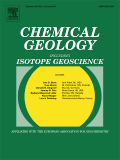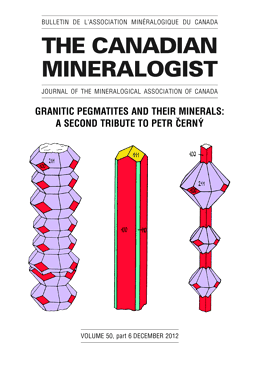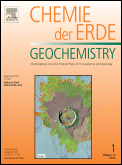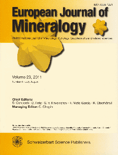
Journal of Gemmology
Scope & Guideline
Shaping the Future of Gemstone Scholarship
Introduction
Aims and Scopes
- Gemmological Research:
The journal emphasizes the scientific exploration of gemstones, including their physical and chemical properties, inclusions, and gemological characteristics. - Mineral Analysis:
It covers studies on various minerals that can be classified as gemstones, focusing on their geological formation, classification, and identification techniques. - Technological Innovations:
The journal showcases advancements in gemmological instrumentation and techniques, such as spectroscopy and other analytical methods used for gemstone identification and treatment detection. - Sustainability and Ethical Sourcing:
There is a growing focus on the sustainability of gem and mineral sourcing, including discussions on responsible mining practices and environmental impact. - Cultural and Historical Context:
The journal also explores the historical significance and cultural implications of gemstones, including their use in jewelry and artifacts.
Trending and Emerging
- Geochemical and Spectroscopic Analysis:
There is a notable increase in studies utilizing geochemical and spectroscopic methods to determine the origins and authenticity of gemstones, highlighting the importance of advanced analytical techniques. - Emerging Gem Materials:
Research on newly discovered or uncommon gem materials is on the rise, showcasing the diversity of gemstones available in the market and the need for updated gemological knowledge. - Ethical Considerations and Traceability:
An emerging theme is the focus on ethical sourcing and traceability of gemstones, driven by consumer demand for sustainability and transparency in the gemstone industry. - Inclusion Studies:
There is a growing interest in the study of inclusions within gemstones, providing insights into their formation processes and assisting in origin determination. - Gemstone Treatments and Innovations:
Research into new treatments and enhancements for gemstones is becoming more prevalent, reflecting the industry's ongoing innovations and the need for gemmologists to stay informed.
Declining or Waning
- Synthetic Gemstones:
Research on synthetic gemstones, while still relevant, has seen a decrease in frequency as the market becomes saturated and the focus shifts towards natural stones and their characteristics. - Traditional Gem Treatments:
The exploration of traditional treatments for enhancing gemstone appearance is becoming less common, as newer, more advanced treatments and their implications gain attention. - Historical Gemology:
While historical studies are valuable, there has been a noticeable decline in papers focusing solely on the history of specific gemstones or artifacts, as contemporary research trends towards practical gemmological applications.
Similar Journals

Applied Earth Science-Transactions of the Institutions of Mining and Metallurgy
Illuminating the Intersection of Earth Sciences and IndustryApplied Earth Science - Transactions of the Institutions of Mining and Metallurgy, published by SAGE Publications Inc, is a vital academic journal located in the United Kingdom that seeks to illuminate the intricate relationship between earth sciences and the mining and metallurgy industries. With an ISSN of 2572-6838 and an E-ISSN of 2572-6846, the journal features peer-reviewed research encompassing various subfields such as Geochemistry, Petrology, and Geotechnical Engineering. As an open-access journal, it ensures that cutting-edge findings are readily available, promoting broad access to knowledge crucial for professionals, researchers, and students alike. With its convergence of research years from 2018 to 2024, the journal maintains a Q3 ranking in Earth and Planetary Sciences and Q4 rankings in Geochemistry and Petrology as well as Geotechnical Engineering, which demonstrates its emerging influence in these disciplines. The journal not only provides a platform for innovative research but also addresses practical challenges faced within the field, making it essential reading for those engaged in the applied earth sciences.

CHEMICAL GEOLOGY
Transforming Geological Knowledge into Actionable InsightsChemical Geology is an esteemed international journal published by Elsevier, dedicated to the rigorous exploration of geochemistry and petrology, with its foundational roots tracing back to 1966. As evidenced by its impressive Q1 ranking in both Geochemistry and Petrology as well as Geology in the 2023 category quartiles, this journal stands as a premier outlet for cutting-edge research and innovative methodologies within these vital fields. With a Scopus rank placing it in the top 10% of Earth and Planetary Sciences, Chemical Geology offers a platform for researchers, professionals, and students alike to disseminate findings that advance our understanding of geological processes and materials. Although it does not currently offer open-access options, the journal remains committed to high-quality publications that contribute significantly to the scholarly community. Located in the vibrant academic milieu of Amsterdam, Netherlands, Chemical Geology is an essential resource for those engaged in the earth sciences, aiming to bridge theoretical insights with practical applications.

ACTA PETROLOGICA SINICA
Innovating Insights into Earth's ProcessesACTA PETROLOGICA SINICA, published by SCIENCE PRESS, is a distinguished journal in the field of geochemistry and petrology, known for its commitment to advancing the understanding of Earth's materials and processes. With an impact factor ranking it in the second quartile (Q2) of its category and a respectable Scopus rank of 64 out of 154, this journal serves as a vital platform for researchers, professionals, and students alike, facilitating the dissemination of innovative studies and findings from 1980 to the present. Its robust editorial board and diverse array of articles make it an invaluable resource for those engaged in the intricate analysis of petrological phenomena and geochemical transformations. Published in China, ACTA PETROLOGICA SINICA provides access to significant original research, reviews, and insights essential for advancing knowledge and fostering collaboration in the earth sciences.

Periodico di Mineralogia
Illuminating Earth Processes Through Rigorous ResearchPeriodico di Mineralogia, published by SAPIENZA UNIV EDITRICE, is a distinguished academic journal based in Italy that has been pivotal in advancing the fields of Geochemistry, Geology, and Geophysics since its inception in 1979. With an ISSN of 0369-8963 and an E-ISSN of 2239-1002, the journal boasts a solid reputation reflected in its Q3 category rankings across these disciplines as per 2023 metrics. The journal’s scope encompasses a broad range of topics related to mineralogy and earth sciences, providing a vital platform for researchers, professionals, and students to disseminate their findings. Despite the absence of an Open Access option, Periodico di Mineralogia remains an essential resource for the dissemination of high-quality research that contributes to our understanding of earth processes and materials. Situated in the heart of Rome at PIAZZALE ALDO MORO 5, it serves as a crucial bridge between academic research and practical applications in geology and planetary sciences.

CANADIAN MINERALOGIST
Bridging Knowledge Gaps in Mineral ScienceCANADIAN MINERALOGIST is a prestigious academic journal published by the Mineralogical Association of Canada, primarily focusing on the fields of Geochemistry and Petrology. Established in 1980, this journal has fostered a rich tradition of scholarly communication, offering a platform for researchers from around the world to share significant advancements and findings related to mineral science. With an impact factor that reflects its relevance within the scientific community, the journal occupies a notable position, ranked in the Q3 quartile within its category according to the 2023 assessments. The E-ISSN 1499-1276 ensures that online access is readily available, making it easier for readers to engage with cutting-edge research. With its headquarters in Quebec, Canada, CANADIAN MINERALOGIST not only contributes to the academic landscape in North America but also plays a vital role globally in advancing the understanding of mineralogy. Its commitment to high-quality publishing supports both the dissemination of knowledge and the nurturing of a vibrant scientific community.

Minerals
Advancing mineral sciences for a sustainable future.Minerals, an esteemed open-access journal published by MDPI, has been at the forefront of advancing knowledge in the fields of geology, geotechnical engineering, and engineering geology since its inception in 2011. With an E-ISSN of 2075-163X, this journal aims to foster innovative research and disseminate critical findings that influence both academia and industry practices. Based in Switzerland, Minerals has made significant strides in its impact, evidenced by its 2023 Scopus rankings placing it in the 74th percentile in Geology and 63rd percentile in Geotechnical Engineering. The journal, which will continue to publish until 2024, encourages submissions that explore the multifaceted aspects of mineral sciences, highlighting the importance of sustainable practices and advancements in technology. Researchers, professionals, and students are invited to engage with this vital resource, which not only contributes to the expansion of geological knowledge but also supports the global understanding of mineral resources.

Geochemistry
Pioneering Insights in Geochemistry and BeyondGeochemistry is a distinguished academic journal published by Elsevier GmbH, focusing on the intricate study of geochemical processes across earth systems. With its ISSN 0009-2819 and E-ISSN 1611-5864, this journal serves as a crucial platform for scholars and researchers eager to disseminate their latest findings in geochemistry, petrology, and geophysics. The journal has established itself within the scientific community, achieving a Q2 ranking in both Geochemistry and Petrology as well as Geophysics, showcasing its significant impact and relevance—ranking 18th out of 165 in Geophysics and 26th out of 154 in Geochemistry and Petrology according to Scopus. From its inception in 1978 to its ongoing contributions through 2024, Geochemistry remains a vital resource for academic discourse and innovation in earth sciences. As an open-access title, it allows for broader dissemination of knowledge, promoting accessibility for researchers, students, and professionals. Whether you are engaged in theoretical research or applied studies, Geochemistry provides the insights necessary to advance our understanding of the planet's chemical complexity.

EUROPEAN JOURNAL OF MINERALOGY
Catalyzing dialogue and discovery in the realm of minerals.The EUROPEAN JOURNAL OF MINERALOGY, published by COPERNICUS GESELLSCHAFT MBH, is a pivotal open-access journal dedicated to advancing the fields of Geochemistry and Petrology. With a rich history spanning from 1989 to 2024, this journal has established itself as a key resource for researchers and professionals alike, achieving a commendable Q2 category ranking in its field for 2023. Its inclusion in the Scopus database ranks it 79 out of 154 in Earth and Planetary Sciences, reflecting its impact within the scientific community. With an open access model since 2020, the journal facilitates broad dissemination of high-quality research findings, thereby enhancing accessibility and engagement among scholars and students globally. Set against the backdrop of Germany’s vibrant academic landscape, the EUROPEAN JOURNAL OF MINERALOGY continues to play a crucial role in fostering dialogue and innovation in mineralogical sciences.

Acta Montanistica Slovaca
Advancing Earth Sciences through Open Access InnovationActa Montanistica Slovaca, published by the BERG Faculty of Technical University Košice in Slovakia, stands as a significant open-access platform since 2004 for disseminating high-quality research in the fields of geochemistry, petrology, geology, and geotechnical engineering. With a rising impact highlighted by its current standings in the 2023 Category Quartiles—ranking Q3 in Geochemistry and Petrology, and Q2 in both Geology and Geotechnical Engineering—it serves as a vital resource for scholars and practitioners alike. The journal's Scopus rankings further underscore its influence, placing it in the 69th percentile for Earth and Planetary Sciences in Geology and demonstrating its commitment to advancing knowledge in dynamically evolving fields. The journal not only embraces a wide international readership but also encourages the open exchange of innovative ideas, making it a crucial tool for research, education, and collaboration.

Riset Geologi dan Pertambangan
Connecting researchers to drive advancements in earth sciences.Riset Geologi dan Pertambangan is an esteemed open-access journal published by the Indonesian Institute of Sciences, R&D Centre Biology, dedicated to advancing research in the fields of geology and mining. With an ISSN of 0125-9849 and an E-ISSN of 2354-6638, this journal has been fostering the dissemination of knowledge since 2005, ensuring that critical findings are accessible to a global audience. The journal serves as an important platform for researchers, professionals, and students to share innovative research, methodologies, and case studies that contribute to sustainable mining practices and geological advancements. By promoting interdisciplinary collaboration and the latest developments in the field, Riset Geologi dan Pertambangan plays a vital role in shaping the future of geology and mining research, particularly within the Southeast Asian context.